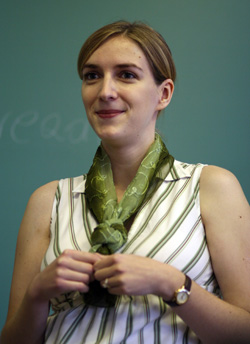 Assistant Professor of English, Agata Szczeszak-Brewer was recently recognized for her research on Joseph Conrad and James Joyce.
Assistant Professor of English, Agata Szczeszak-Brewer was recently recognized for her research on Joseph Conrad and James Joyce.
Szczeszak-Brewer was awarded the Bruce Harkness Young Conrad Scholar award given by the Joseph Conrad Society of America. The award recognizes a graduate student or recent Ph.D who publishes and presents on Conrad. The winner is chosen on the basis of the candidate’s curriculum vitae, a sample of scholarly writing, and letters of recommendation.
She received an honorarium and award for her work at the Conrad Society dinner during the Modern Language Association convention in December. She also presented two papers while attending the San Francisco convention.
"Being recognized by the Joseph Conrad Society of America is very humbling," Szczeszak-Brewer said, "but perhaps and equally exciting award for my engagement with Conrad and Joyce is my students’ fresh interest in these authors, their curiosity about the worlds they portray, and their willingness to tackle some very difficult issues related to their texts."
Within the hour of learning she had received the award, Szczeszak-Brewer got word her book Profane Pilgrimage: Colonial Cosmologies in Conrad and Joyce will be published by the University of Florida Press.
"[The book] investigates Joseph Conrad’s and James Joyce’s responses to the relationship between imperialism and the drive toward the sacred," Szczeszak-Brewer said. "I also talk about Conrad as a ‘schizophrenic’ map-maker, who simultaneously endorses and undermines arbitrary colonial and mythical categories, and Joyce as not so much a map-maker – as many critics have claimed – but a map-mocker, playing with representations of power relying on arbitrary and oppressive codes."
Szczeszak-Brewer’s initial encounter with Conrad’s work was not positive but her second left her "hungry for more. I became fascinated with Conrad’s approach to the questions of terrorism – or political violence in general – anarchism, and individual agency."
Works by and about both authors have influenced Szczeszak-Brewer’s research. "They opened up to me a whole new world of complicated meanings, heated academic debates, and exciting textual discoveries," Szczeszak-Brewer said.
"The works prove that literature is not disengaged from the real world, that it is not just a bunch of words suspended in space and time. These texts prove that literature can have a tangible, positive or harmful, effect on our world. It can shape us in ways we can hardly fathom. As a young scholar, I wanted to examine the ways in which Conrad’s and Joyce’s words shaped and were shaped by others."